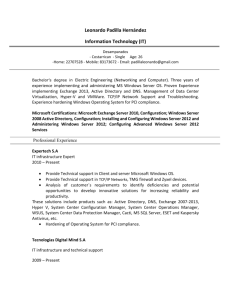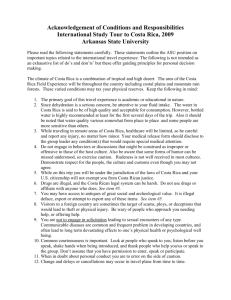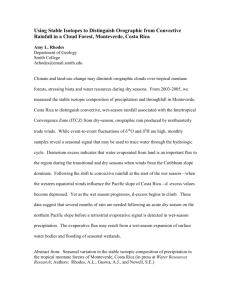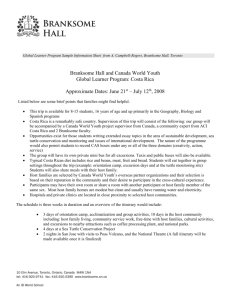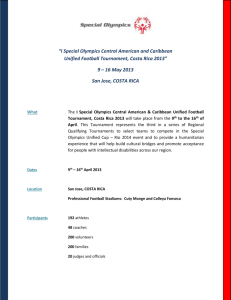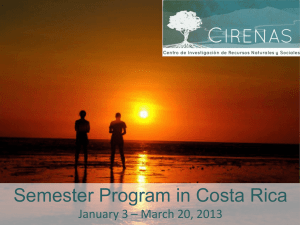Costa Rica, Summer 2008 - Central Connecticut State University
advertisement
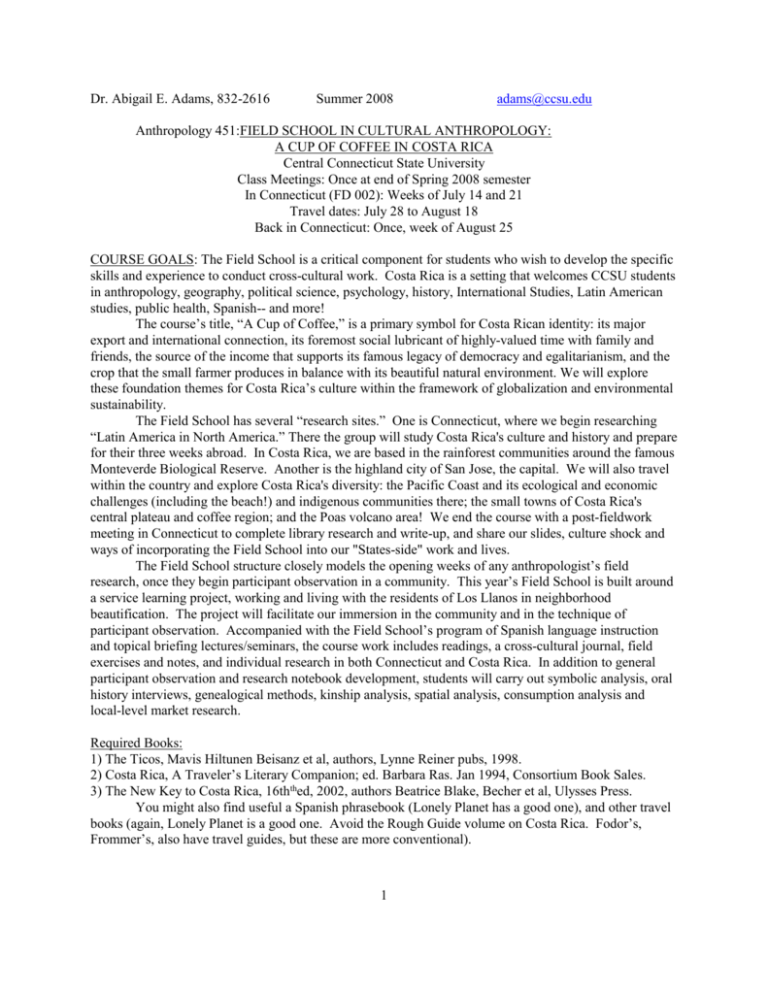
Dr. Abigail E. Adams, 832-2616 Summer 2008 adams@ccsu.edu Anthropology 451:FIELD SCHOOL IN CULTURAL ANTHROPOLOGY: A CUP OF COFFEE IN COSTA RICA Central Connecticut State University Class Meetings: Once at end of Spring 2008 semester In Connecticut (FD 002): Weeks of July 14 and 21 Travel dates: July 28 to August 18 Back in Connecticut: Once, week of August 25 COURSE GOALS: The Field School is a critical component for students who wish to develop the specific skills and experience to conduct cross-cultural work. Costa Rica is a setting that welcomes CCSU students in anthropology, geography, political science, psychology, history, International Studies, Latin American studies, public health, Spanish-- and more! The course’s title, “A Cup of Coffee,” is a primary symbol for Costa Rican identity: its major export and international connection, its foremost social lubricant of highly-valued time with family and friends, the source of the income that supports its famous legacy of democracy and egalitarianism, and the crop that the small farmer produces in balance with its beautiful natural environment. We will explore these foundation themes for Costa Rica’s culture within the framework of globalization and environmental sustainability. The Field School has several “research sites.” One is Connecticut, where we begin researching “Latin America in North America.” There the group will study Costa Rica's culture and history and prepare for their three weeks abroad. In Costa Rica, we are based in the rainforest communities around the famous Monteverde Biological Reserve. Another is the highland city of San Jose, the capital. We will also travel within the country and explore Costa Rica's diversity: the Pacific Coast and its ecological and economic challenges (including the beach!) and indigenous communities there; the small towns of Costa Rica's central plateau and coffee region; and the Poas volcano area! We end the course with a post-fieldwork meeting in Connecticut to complete library research and write-up, and share our slides, culture shock and ways of incorporating the Field School into our "States-side" work and lives. The Field School structure closely models the opening weeks of any anthropologist’s field research, once they begin participant observation in a community. This year’s Field School is built around a service learning project, working and living with the residents of Los Llanos in neighborhood beautification. The project will facilitate our immersion in the community and in the technique of participant observation. Accompanied with the Field School’s program of Spanish language instruction and topical briefing lectures/seminars, the course work includes readings, a cross-cultural journal, field exercises and notes, and individual research in both Connecticut and Costa Rica. In addition to general participant observation and research notebook development, students will carry out symbolic analysis, oral history interviews, genealogical methods, kinship analysis, spatial analysis, consumption analysis and local-level market research. Required Books: 1) The Ticos, Mavis Hiltunen Beisanz et al, authors, Lynne Reiner pubs, 1998. 2) Costa Rica, A Traveler’s Literary Companion; ed. Barbara Ras. Jan 1994, Consortium Book Sales. 3) The New Key to Costa Rica, 16ththed, 2002, authors Beatrice Blake, Becher et al, Ulysses Press. You might also find useful a Spanish phrasebook (Lonely Planet has a good one), and other travel books (again, Lonely Planet is a good one. Avoid the Rough Guide volume on Costa Rica. Fodor’s, Frommer’s, also have travel guides, but these are more conventional). 1 Requirements: Journal/Reading Response (25%) Field Exercises and Book (25%) Topical Research paper, including an 8-10 page write-up (25%) and Peer Review (5%) Attendance, participation and development of the Field School (20%) READINGS AND CLASS SCHEDULE: PART ONE: Preparation for Costa Rica and Connecticut Field Research April 2008: Getting Together, Getting Ready! Welcome, long term preparations, how to keep your journal and reading response books, cross-cultural experiences Reading: Key…, Chapter 3, Planning Angrosino, chapter on the field school experience Journal and Reading Response: Your preconceptions of Costa Rica Becoming Bicultural July 14: Introduction to Costa Rica and the White Myth Reading: The Ticos, Chapters 1 and 2 Key…, Chapters 1, 2, 5 CR:Literary Companion, Northern Zone, “Believe It or Not,” Lecture on Costa Rica’s white myth, history and pride in national parks July 15 and 16: Costa Rica in the World System Reading: The Ticos, Chapters 3 and 4 CR: Literary Companion, San Jose and…, “Faust in Hatillo,” “The Chumico Tree” Northern Zone, “The Girl who Came from the Moon,” Costa Rica, “Here,” “Pastor’s Ten Little Men” Journal and Reading Response: Lecture on Globalization, CAFTA-DR and Class Exercise on observation, house and spatial mapping Keeping a field notebook July 17: The White Myth and Costa Rica’s Diversity Reading: The Ticos, Chapters 5 and 6 Key…, Chapter 8 CR: Literary Companion, Atlantic Zone, stories by Falla and Duncan What Happen?, selections Sibo’s Gifts, selections Reserve, “The Negro of the Family,” Roger Lancaster Lecture: Costa Rica’s diversity Exercise: Informal interviewing July 21 and 22: La Familia: Kinship, Gender and Society Reading: The Ticos, Chapters 7-8 CR: Literary Companion, The Targua Tree,” “The Adventure,” and “Mint Flowers” Lecture: Kinship analysis Exercise: Kinship analysis 2 July 23: A Day in the Life of… Everyday Education Reading: The Ticos, Chapters 9 Lecture: “Our best soldiers are our teachers” Exercise: Time diary July 24: Worldview and What Matters Reading: The Ticos, Chapters 10 and 11 CR; Literary Companion, “Bucho Vargas,…” and “The Mystery Zone” Exercise: House Mapping July 25: Environment and Society Movie: Caribe PART TWO: Field School in the Countryside: Monteverde and Los Llanos Monday, July 28: Fly Out, Bradley International, 6 am. Arrive in San Jose, Hotel El Sesteo, Meet and totter around the neighborhood Tuesday, July 29: Travel to Monteverde, by way of the National park of Volcano Poas and neighboring towns, stay in Hotel El Bosque Wednesday, July 30: Welcome by the Monteverde Institute, move to Host Families in Los Llanos Thursday, July 31: Introduction to Service Project, Spanish language lessons and field research class Friday, August 1: Spanish language and field research classes, Service Project Saturday, August 2: Day in San Luis, waterfalls, finca La Bella, free time! Sunday, August 3: Choose a church service, free time with families, late afternoon dance class! Monday, August 4: Spanish language and field research classes, Service Project Tuesday, August 5: Spanish language and field research classes, Service Project, visit with women’s cooperative CASEM Wednesday, August 6: Spanish language and field research classes, Service Project Thursday, August 7: Spanish language and field research classes, Service Project, dance class! Friday, August 8: Spanish language and field research classes, Service Project Saturday, August 9: Travel to Las Juntas gold mine and hot springs! Sunday, August 10: Choose another church service, free time with families, movie night! Monday, August 11: Spanish language and field research classes, final presentation prep, Service Project Tuesday, August 12:.Final presentation and farewell banquet Wednesday, August 13: Travel to Pacific Coast and Samara beach, meet with local cattle and subsistence farmers coop Thursday, August 14: Beach Day! Use sunblock, hats, and long sleeves. Really. Friday, August 15: Travel to San Jose, stopping by indigenous ceramics coop, stay in Hotel El Sesteo Saturday, August 16: San Jose, souvenir shopping, visit with women’s housing coop, Hotel el Sesteo Sunday, August 17: Paseando in San Jose, Plaza de la Cultura and Plaza de la Democracia, Hotel el Sesteo Monday, August 18: Fly Back Home to Connecticut PART THREE: Back in Connecticut Week of August 25: Get together, share culture shock and photographs Develop tips for future students and future field schools Final Work Due! Grading Policies: 1) Class participation is an important part of this course and consists of What We Agree Upon: 3 Policies I have used on past: A) Attendance: More than one absence (a week) will hurt a student's grade. Students are responsible for documenting their attendance by signing the attendance sheet. I am taking attendance to encourage your exposure to the material available only in class and to encourage your participation and support in class discussions. Perfect attendance will help the final grade. After one absence, each further absence deducts two percentage points from final grade. Whether or not you attend the session, you will be responsible for the material presented in class, and I will not reteach class during office hours. B) Participation and Development of the Field School: As part of this class, you are responsible for keeping up with the reading, active listening, discussion participation, supporting each other in sharing, risk-taking and feedback. You are also responsible for developing ideas and exercises and itinerary suggestions that make the Field School Even Better. Very Important: The course is planned carefully and assignments must be completed In Sequence. You will need time to think, read and write. You will also benefit from talking/arguing with each other outside of the class. The Anthropology Library in DiLoreto 002 and the table in the Anthro office have been traditional and well-used venues. Please set aside the time necessary. In the CCSU catalogue, six hours per week outside of class is the standard. Remember that in the CCSU Anthropology Department, we are interested in education and not in MacBachelor’s... 2) Exercises and Book: We’ll do exercises in and out of class, in Connecticut and Costa Rica. 3) Final Paper/Peer Review: There are two possible research strategies for this paper. One strategy is to interview and prepare a life or oral history of a Latin American who interests you. We will practice informal interviewing. You must spend a minimum of three hours with your consultant. In the second strategy, you will choose a topic to research. I will provide a list of possibilities, but you are free to develop your own paper topic based on the issues and debates raised in the course, and the field exercises that you undertake. Your topic MUST BE APPROVED by me. As a scholarly exercise, papers should contain a) a THESIS STATEMENT clearly defining the specific question or issue you will address and WHY it is IMPORTANT, b) the use of at least TWO of the course’s readings, as part of the discussion/comparison of your subject’s life and/or your topic. Descriptive summaries of ethnographic facts or one author’s position will NOT be acceptable. Peer Review: Drafts of papers are due August 25: Bring two copies, one for me and one for a peer reviewer. If you wish, I will assign a number to everyone to use instead of your name. Peer review of the rough draft of another student=s paper shall consist of a two-page evaluation of the paper, drawing on knowledge gained from the course to offer constructive--and specific--comments and suggestions regarding content, organization and style. Essay Writing Suggestions The following pointers are guides for writing a successful essay for my class, as for any class. The first two points are crucial for any good essay, academic or not. 1) Voice: Demonstrate your competence with the reading=s issues and advance an argument, a position, an original and challenging synthesis or hypothesis. 2) Writing: Good writing means good sentence and paragraph structure, a clearly stated thesis, clear typing and accurate spelling. Success in this area goes a long way with me. A first draft seldom demonstrates all of the above. 3) Answer all parts of the question OR talk with me before the due date about your topic idea. 4) Use the class material (the readings, films, class discussion and lecture) in your argument. Do not regurgitate detail to “prove” you’ve kept up; DO present the issues of the materials in your own words. Lengthy quotes are not needed; they use space without demonstrating much. 4 5) Do NOT repeat the question as your thesis sentence. DO indicate in your essay title or cover page that question you are addressing, if several choices were assigned. 6) If the essay length is a minimum of four pages, write four full pages, normal formatting, not 3.75. A good idea is to write 4.25 pages. You should have plenty to say, and I will be happy to suggest points to expand. 4) Journal/Reading Response: You will keep a journal of your thoughts in response to the Field School’s adventures, before, during and after the Costa Rica travel, and in response to the readings. Reading Suggestions: The course material is rich, and challenges our world view. Each chapter or article can be read several times, and with each reading, more becomes clearer, more connections are made, and more consequences become apparent. 1) For a FIRST reading of an assignment, get the MAIN IDEAS. Don’t get stuck in details; these will be helpful in your later readings. Pay attention to the reading focus questions I give. 2) After your first reading and BEFORE class, try to sum up the main focus and your primary response in ONE WORD or PHRASE. 3) Next, sum up the reading in one phrase, such as “This article is about .” This is a topic sentence. 4) Then try one sentence: “This article’s main point is .” This is a thesis sentence. 5) I (and the rest of the class) will always find interesting the connections and consequences that you worked out in the assignment’s first readings. Bring those also! 5) Late and Missed Work: I will deduct one grade level per day for assignments received after the due date. For example, if your paper due Tuesday was handed in on Thursday and earned a B+, it would earn a B-. Late reading journals can receive no grade higher than a B-. 6) Rough Drafts: I am happy to read rough drafts of assignments before their due date. 7) Incomplete Grades: I allow incomplete grades for students who have passed the first half of the course, who have a legitimate reason for not completing the semester's work and who speak with me a week before the final class. GRADING CRITERIA FOR READING, READING JOURNALS, ASSIGNMENTS AND WRITING Grading Criteria: I grade the written or diagramed homework assignments as follows: a) The exercise is handed in on time: in class and on due date b) The exercise demonstrates clarity of communication: correct grammar, punctuation, spelling and sentence structure. Assignment has been proofread and corrected for typos. c) The writing is responsive to the assignment: instructions were followed, including format and length. d) The level of thinking demonstrates: an understanding of course concepts; that facts have been distinguished from opinion; that the concepts are applied creatively or originally. e) Staple all papers--loose leafs or pencil will not be accepted. Do not use plastic folders. Grading Systems: A Prose description of my grading: A: Achievement that is goes well above and beyond, or is truly exemplary, of the assignment B: Achievement that goes significantly above the level necessary to meet the assignment requirements C: Achievement that meets the assignment in every respect D: Achievement that deserves some credit due, even though it does not fulfill the assignment F: Assignment either was not completed, or was not completed in a manner that earned enough credit A Numerical description of my grading: 5 A: A-: B+: B: B-: C+: 100-95% 94.9-90% 89.9-87% 86.9-83% 82.9-80% 79.9-77% C: 76.9-73% C-: 72.9-70% D+: 69.9-67% D: 66.9-63% D-: 62.9-60% Fail: 59.9% and lower Important: Academic Dishonesty: Academic dishonesty includes cheating on assignments, papers or exams, plagiarizing (misrepresenting as your own work any work written by another person), and submitting the same paper or substantially similar paper used to meet the requirements of another course, without arriving at an agreement with all of the professors concerned. Any evidence of these forms of academic dishonesty is grounds for failure in this course. Accommodation and Alternative Formats: Students with disabilities who require accommodations in meeting this course’s requirements should meet with me as early as possible in the semester, in order to work out best options. I would be happy to develop these accommodations with you. It is your responsibility to contact me and provide me with formal documentation BEFORE assignments are due. Students Whose First Language is Not English: Feel free to talk with me early in the semester about any extra assistance that would be helpful in meeting this course’s requirements. I am fluent in Spanish. 6



